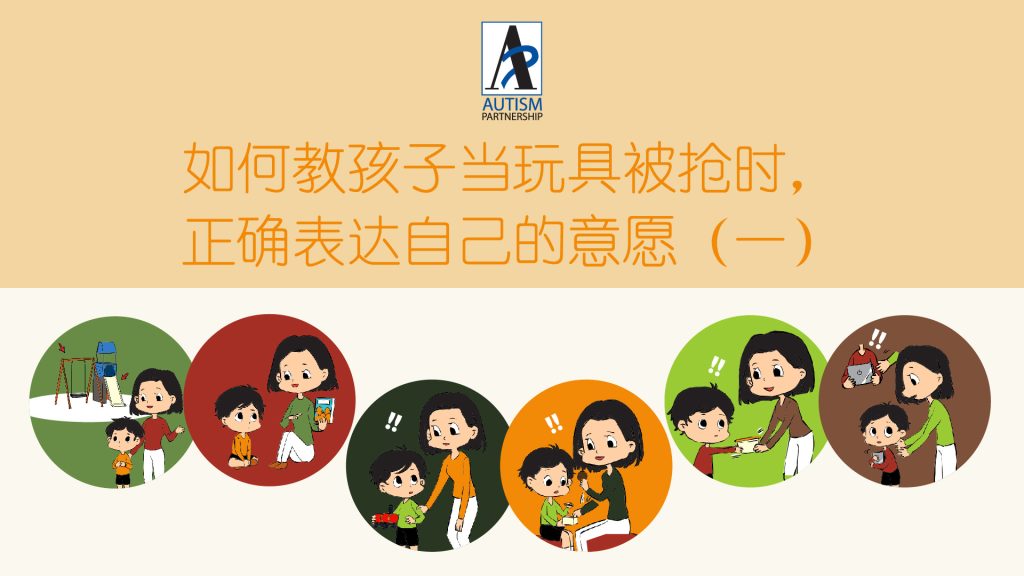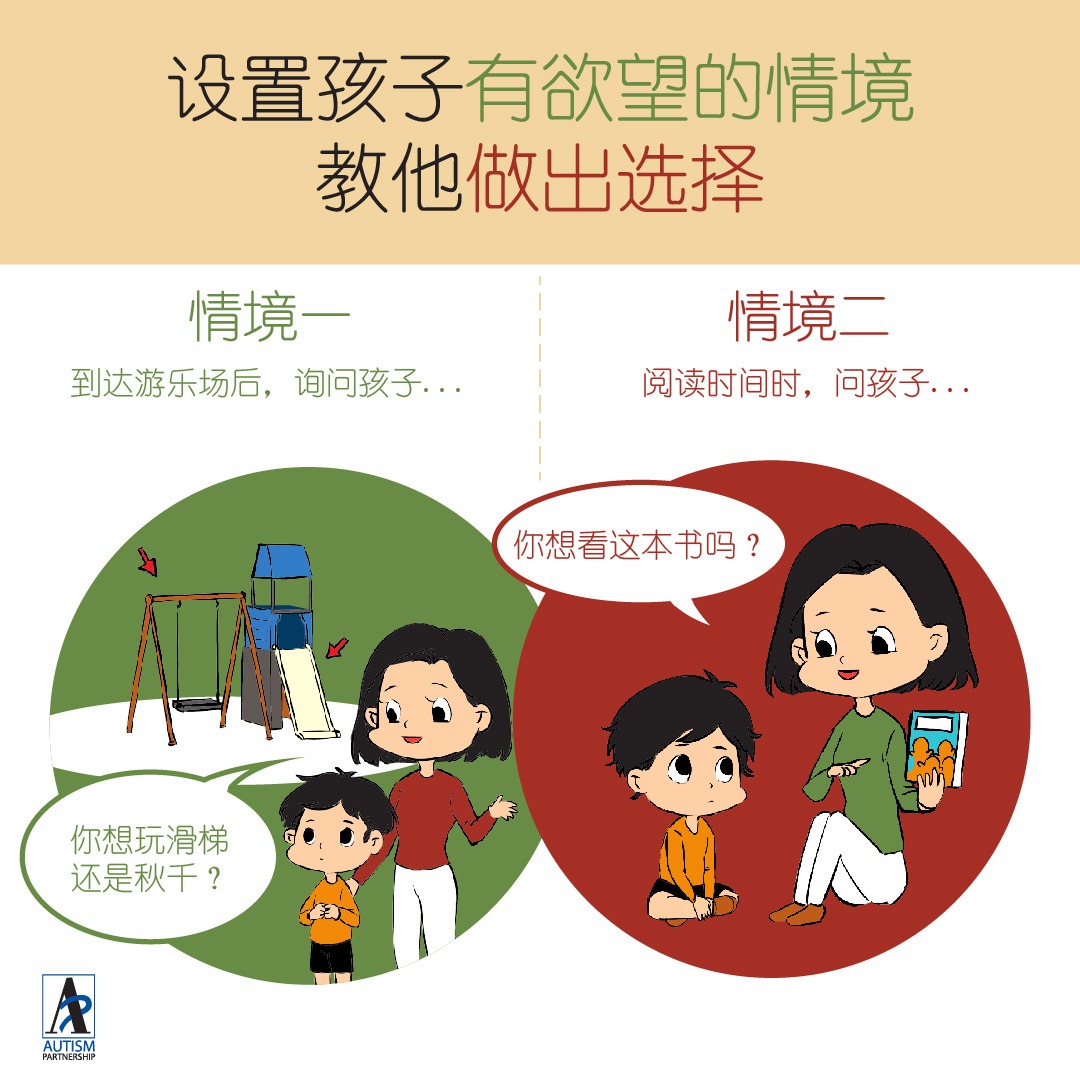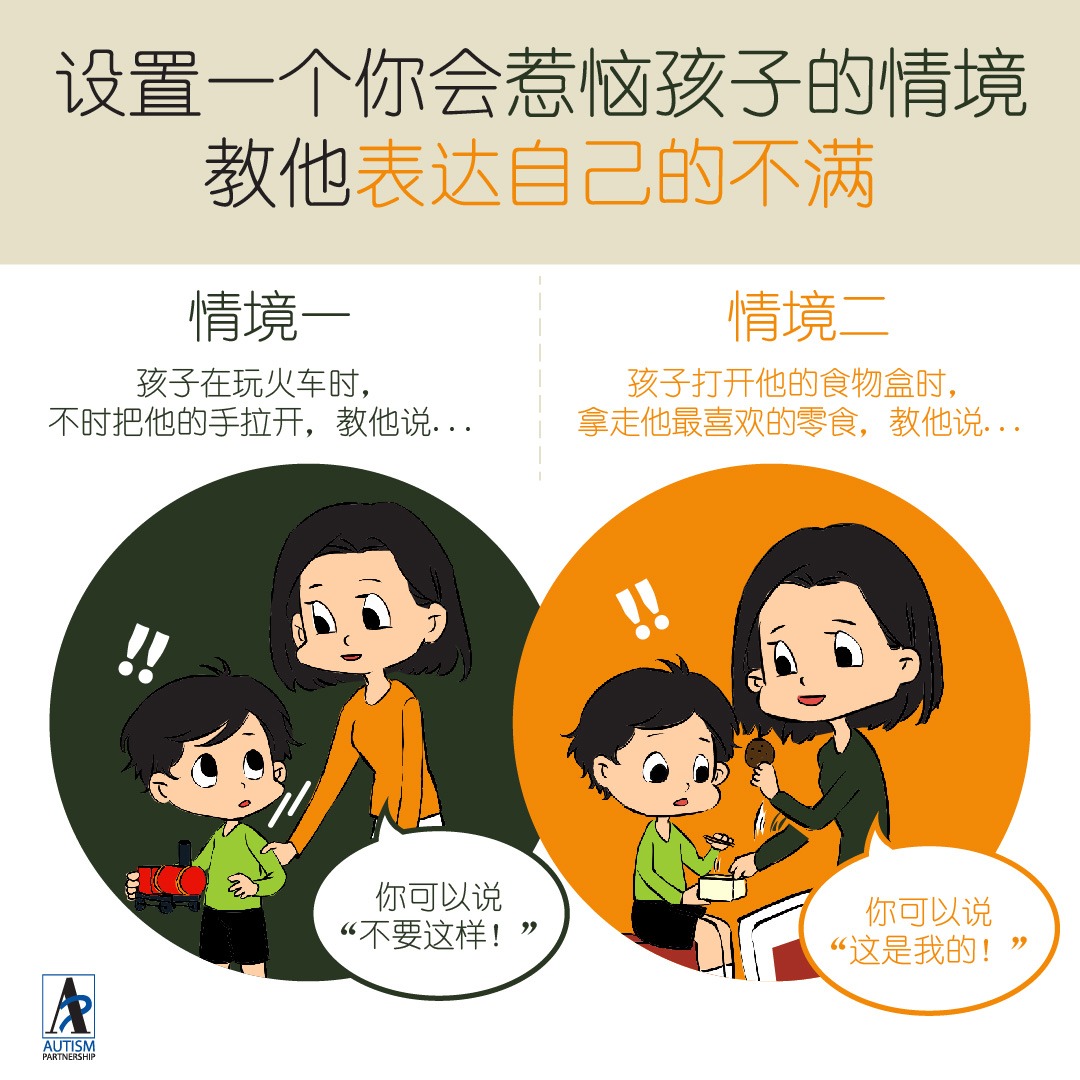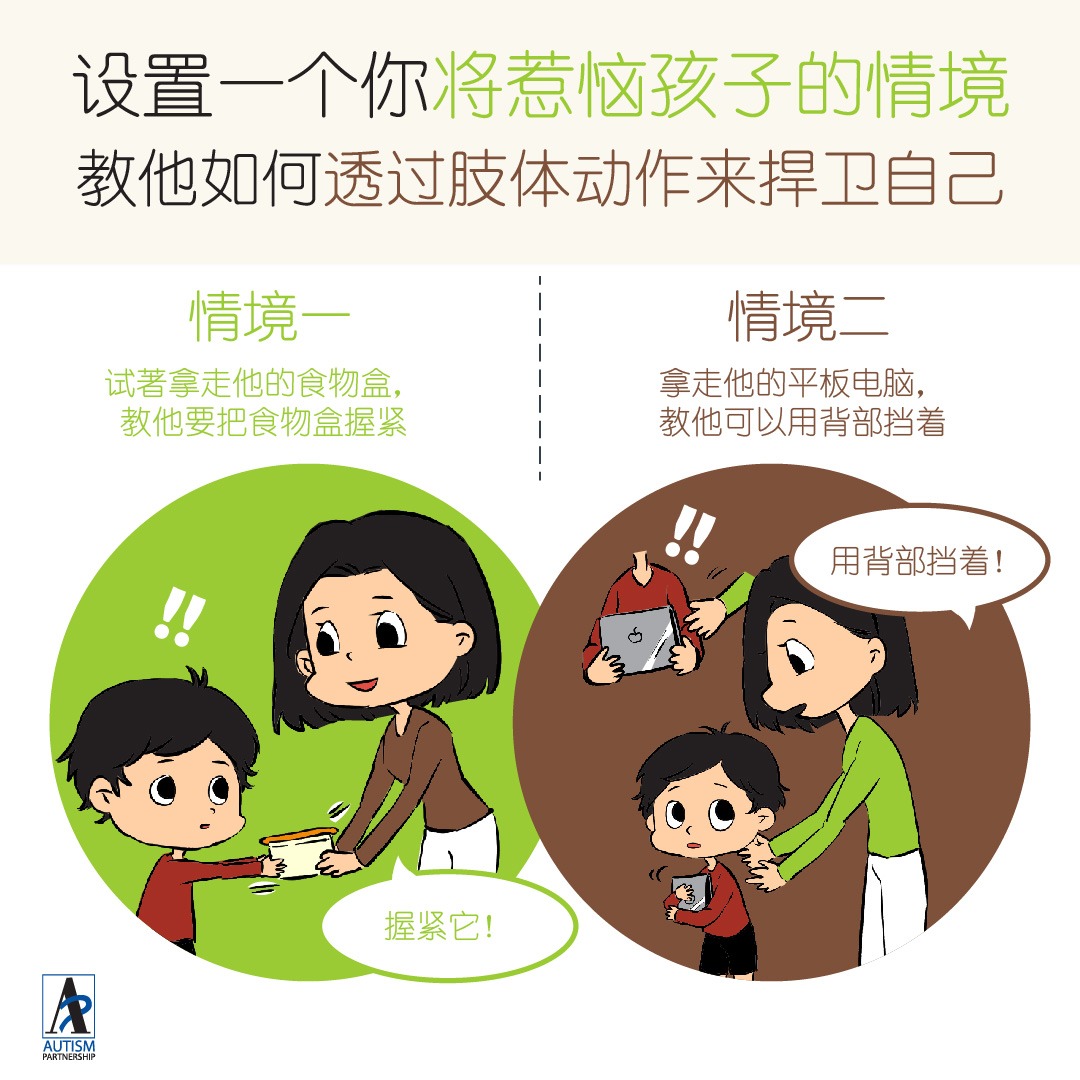
自闭症儿童在与同伴玩耍时经常面对很多困难。很多时候,当我们的孩子被同伴抢走他们正在玩的玩具时,他们会不知道如何处理。不同的孩子会有不同的反应,有的孩子可能比较被动,不作任何反应;有的孩子可能会很急躁,继而情绪爆发;部分孩子可能会用极端的方式取回玩具,例如把玩具抢过来,对同伴作出攻击性行为。
在这篇文章中,我们将讲解当上述情况发生时,我们可如何帮助表现得较为被动的孩子。关键是有系统地培养他们的「敢言」技巧。
在真实有同伴的社交活动之前,家长可以先在家中开始练习,以下是一些简单的做法:
例如,到达游乐场后,询问孩子「你想玩滑梯还是秋千?」
阅读时间时,问孩子「你想看这本书吗?」

例如,当孩子在玩火车时,不时把他的手拉开,教他说「不要这样!」
当孩子打开他的食物盒时,拿走他最喜欢的零食,教他说「这是我的!」

例如,试着拿走他的食物盒,教他要把食物盒握紧
试着拿走他的平板计算机,教他可以用背部挡着

当孩子熟悉了作选择,并能够更稳定、一致地表达自己的不满时,我们可以进一步在不同的地点,使用不同的材料及加入同伴,仿真物件被抢走的情况。举例说,如果你一直跟孩子在家使用火车玩具练习敢言技巧,你可以把火车玩具带到社交场合,先练习由成人抢走孩子的玩具,如果孩子能敢言,可以进一步练习由同伴抢走玩具。透过有系统的实践,孩子会对这些社交情况有更好的认识,能更独立地参与社交活动,减少成为受害者的机会。


在《精神疾病诊断与统计手册》第五版(DSM-V)中,自闭症谱系障碍(ASD)的诊断标准包含四项行为症状。其中一项为:「刻板或重复的动作行为、物品使用或言语(例如:重复地挥动双手、把玩具排成一行或旋转不同物品或玩具、鹦鹉式重复句子、用特殊或创作语句作沟通(称公园为妈妈,因为每次都是妈妈带小朋友去公园游玩)等)」。尽管展现这些重复性行为并非诊断的必要条件,但这些行为已逐渐被视为自闭症的核心特征之一,并经常在口语中被称为「自我刺激行为(stimming)」或「刻板行为」。 随着社会对自闭症症状与行为表现的认识提升,自我刺激行为已成为大众关注的一部分,也是在自闭症(Autism)及发展障碍社群中经常被讨论的主题 。以下我将会简单分享家长们可以如何应对重复性行为,但开始前我们先来一起了解自我刺激行为的本质。 自我刺激行为之所以出现,是因为它们能直接给人带来良好感觉,或舒缓不适。这被称为自动强化 (automatic reinforcement)。即使不是所有自我刺激行为都来自同样或单一原因,但这是常见的原因之一。我们需要注意的是,并非所有自我刺激行为都是有问题的,要记住,一般人也会有自我刺激的行为,例如绕头发、玩弄掰手指关节、转笔等等,都是一般人会重复的行为,但这些行为很少会影响生活或工作表现。因此自闭症儿童的一些自我刺激行为,如在房间来回踱步、重复台词、照镜子做鬼脸,也可能完全无害。然而,当我们发现自我刺激行为会影响学习、社交互动或安全性,这时就有必要考虑是否需要介入。举例来说,若孩子重复地把教具排成一行或在课堂中鹦鹉式重复句子而无法跟随课堂指令、影响与朋友互动,或可能造成自我伤害,则需进一步观察与处理。 当家长们决定介入的时候,第一步我们要先观察和了解孩子行为背后的原因。 父母可以尝试观察孩子的行为,其发生的时间以及其后的反应 (例如:发生行为之后有否响应他人,有否察觉照顾者已经离开或情绪有否改变等)。如果家长们发现重复性行为出现在多个不同的情境,尤其是在独处时, 那么该行为是自我刺激的可能性就会增加。 第二步,我们要在没有出现自我刺激行为时给予赞赏,让孩子明白这是我们期望的适当行为。 第三步,当孩子在投入自我刺激时我们可使用温和的转移注意策略,让儿童的注意力投入在我们的对话或活动中,从而减少进行自我刺激。 第四步,也是最重要的是我们要积极地教导儿童功能性的替代行为,例如教导有趣的适龄的玩具和活动以减少无聊时的自我刺激行为。 我们要明白完全消除自我刺激行为并不现实,也非必要。对某些孩子而言,压抑这些行为可能会造成压力与疲惫,反而得不偿失。因此,在处理行为问题时,我们应该要仔细观察和分析,准备有系统而灵活的计划,根据孩子的行为和反应作出适当的调整,耐心地与孩子一起练习与成长。

在多年的自闭症干预经验中,我们发现, 如果小组课堂采用系统的教学方法,并为每个孩子设定明确且个性化的教学目标,学生通常能够更顺利地适应学校环境。然而,要在小组课中有效学习,学生需要首先掌握一些基础能力. 大部份学生需要先通过一对一的密集培训建立这些技巧。 孩子在小组课之前需要先掌握哪些能力? 要在小组课堂中有效学习,孩子要先在以下四大核心领域展现一定的能力: 学前准备四大核心领域 1、行为管理 能管理并减少自我刺激行为(例如拍手、摇晃身体等) 极少或没有干扰性行为(例如发脾气、攻击、拒绝配合) 2、基本的「学习如何学习」技巧 安坐或站好 持续地回应提示 能耐心等待,并以恰当方式引起他人注意 能独立完成简单任务, 包括离座任务 能在极少监督下维持专注 理解基本的学习制度,例如代币制度、「time-in」行为管理制度 3、语言与沟通能力 理解小组指令,包括集体、个别及条件指令 能执行多步骤指令 能清晰并恰当地表达需求 4、自理能力 已完成如厕训练 能独立或在一些协助下日常程序(例如穿鞋、洗手等) 在决定是否让孩子参加小组课堂时,除了考虑他们目前的能力,其他因素也同样重要。孩子的年龄、发展水平、与其他学生的相处等因素都可能对他们的学习效果产生影响. 如果您的孩子还未完全掌握上述基础能力,我们建议首先进行一对一的训练,以帮助他们建立这些技能。学生应在具备一定独立性后再参与小组课堂,这样他们才能在没有父母、照顾者或助教持续帮助的情况下,有效地学习。 在接下来的文章中,我们将分享帮助孩子做好入学准备的方法,包括如何帮助他们从幼儿园成功过渡到小学。
我们相信,优质的AP教学法™(APM™)能帮助每一位自闭症人士发挥其潜能,让他们变得更独立,拥有更美满的人生。
立即报名以获取更多有关ABA及自闭症的资讯。请输入您的电子邮件。
上海中心
